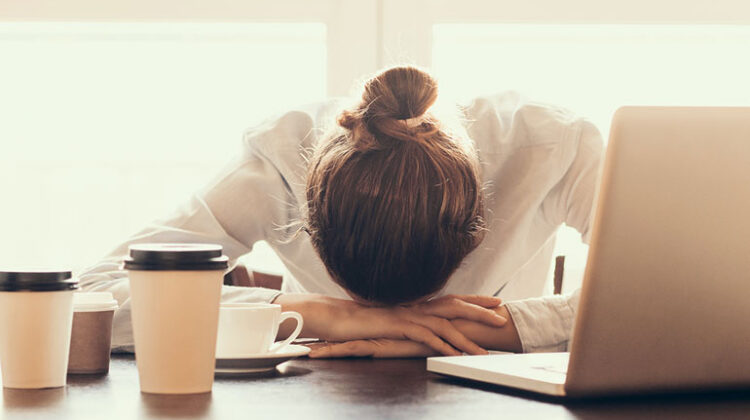
Everyone experiences insomnia after a night of minimal sleep. According to research, even after a night without enough sleep, people can feel tired during the day with a lack of concentration, lethargy, and irritable moods.
Sleep Deprivation
What most don’t know is that sleep deprivation, or what most refer to as sleep deficiency, is one of the main causes of chronic health issues like depression. In fact, as per a study by the CDC, almost a third of American adults suffer from sleep deprivation issues.
To avoid these long-term effects, it’s essential to avoid sleep deprivation. Understanding what it is, the various causes, diagnoses, and treatments can put you in a better position to make sure you get enough sleep.
Sleep Deprivation – A Deeper Look
As mentioned, sleep deprivation refers to a condition where an individual doesn’t get enough sleep. According to health experts, adults need about six to eight hours of sleep while teens and children need slightly more hours of sleep than adults.
Sleep deprivation occurs if you:
- Don’t get enough sleep
- You have a sleep disorder that doesn’t let you get enough sleep
- You sleep at the wrong time – when you’re not in sync with your body’s natural clock
- Use electronic devices close to bedtime
While a short bout of sleep deficiency might not be a serious concern for most people, frequent sleep deprivation can trigger a myriad of health issues. Deficient sleep can lead to increased inflammation, mental issues, poor cognitive function, reduced sex drive, mood shifts, and reduced immunity.
If your sleep issue worsens, it might even lead to chronic illnesses, like type 2 diabetes, psychosis, depression, hypertension, obesity, and cardiovascular disorders.
How Much Sleep Do We Need?
According to the National Sleep Foundation, the right amount of sleep every human being needs significantly depends on their age. The organization recommends this sleep schedule for various age groups:
| Age | Hours of sleep | |
| Infants | 4–12 months | 12 to 16 hours (naps included) |
| Toddlers | 1–2 years | 11 to 14 hours |
| Pre-schoolers | 3–5 years | 10 to 13 hours |
| Pre-teens/Tweens | 6–12 years | 9 to 12 hours |
| Teenagers | 13–18 years | 8 to10 hours |
| Adults | 18–60 years | 7 to 10 hours |
When determining the amount of sleep you need each night, you should also consider the quality of sleep you need. If you don’t get quality sleep, then you are likely to feel lethargic the next day regardless of how much sleep you got.
Low-quality sleep might be triggered by the following issues:
- Waking up frequently throughout the night
- Breathing issues like sleep apnea
- An unflattering bed – you might need to change your mattress
- An environment that’s too chilly, hot, or loud
What’s the Importance of Sleep?
The importance of sleep can’t be underestimated. Sleep plays a significant role in ensuring you live a healthy and fulfilling life. Getting enough sleep helps safeguard your mental health, lifestyle, and safety.
How you feel when you’re awake depends on the quality and quantity of sleep you get every night. When you’re asleep, the body works to support healthy cognitive function and helps maintain your physical well-being. In children, quality sleep promotes growth and development.
Therefore, if you want to lead a healthy life, you need to find the best ways to combat sleep problems. Lucky for you, here are some scientifically proven ways to help you deal with issues of sleep deprivation.
How Can You Combat Sleep Deprivation Issues?
If you have been struggling with sleep deficiency or daytime drowsiness, consulting a medical professional is the first step to getting relief. Your doctor can effectively assess your situation and recommend the best treatment for you.
In most cases, a change in sleep hygiene – bedroom environment and lifestyle can help boost your sleep patterns, but other times, you need to consider the following options:
Pharmacologic Intervention. When nothing seems to work, sedative-hypnotic meds might be the best solution for you. Some of the best sleep deprivation medications include:
- Doxylamine (Unisom)
- Diphenhydramine (Benadryl)
If they don’t work, your physician might prescribe:
- Top sleep aid supplements
- Zolpidem (Ambien)
- Temazepam (Restoril)
Behavioral & Cognitive Treatments.
If medication is not for you, your physician might recommend various treatments like:
- Cognitive Therapy – This might help you figure out thought patterns that might be triggering your sleep deprivation issues.
- Relaxation exercises – Meditation, guided imagery, mindfulness practices, and breathing exercises can help reduce tension. Some sleep apps might also help boost your sleep patterns.
Alternative Therapies. You might also want to try some treatment options like:
- Massages
- Acupuncture
- Valerian
- Yoga
- Tai Chi
- Melatonin – particularly effective in adults aged 40 to 70
- Ayurveda wellness practices
- Acupressure
However, before you try these practices, make sure to consult with your doctor as they might have adverse effects when combined with medication.
Lifestyle Changes. Your sleep hygiene is one of the most effective ways of dealing with sleep deficiency. It involves positive lifestyle habits that allow you to get better sleep. These lifestyle changes include:
- Exercise – Like with other health issues, regular exercise can help you combat sleep problems. So, make sure to do some nighttime exercises 20 to 30 minutes a day, and your sleep issues will be a thing of the past.
Also, remember to work out five to six hours before bedtime since exercising too late can mess with your sleep patterns.
- Exposing Yourself to Natural Light – Natural light can help regulate melatonin production (the sleep hormone), allowing you to have improved sleep patterns.
- Avoid Consuming Coffee at Night – According to studies, taking a cup of coffee six hours before bedtime can trigger sleep deprivation issues. So, ensure that you take your last cup before noon for improved sleep quality.
- Put Away Electronics Before Bedtime – In this technologically advanced era, it’s hard to keep away from social media just before bed. However, various studies show that the blue light from the screen can fuel your brain while also reducing the melatonin levels in your body.
To prevent this, make sure to avoid using your phone or laptop 30 minutes to an hour before bedtime.
- Avoid Consuming Too Much Alcohol Before Bed – Even though alcohol is known to boost sleepiness, it can also disrupt your sleep quality. Therefore, ensure that you avoid consuming too much before going to bed.
- Adopt a Healthy Bedtime Routine – Like your skincare routine, developing a healthy nighttime routine might help your body and mind prepare for sleep. This can include adopting a relaxing regimen like:
Lighting up calming candles – chamomile-infused candles or lemongrass is particularly helpful
Stretching
Meditation
Taking a warm bath
- Create A Suitable Sleep Environment – You might get enough sleep if your bedroom is cozy and relaxing. This might involve:
Turning off your electronics
Keeping your bedroom cool
Covering up noise with a white noise machine
Using a snug mattress and pillow
Frequently Asked Questions
What is the main cause of sleep deprivation? – Sleep deprivation is often triggered by voluntary choices like being exposed to the blue light 30 minutes before bed or consuming caffeinated drinks right before bed. However, this might also be caused by issues like schizophrenia, depression, anxiety, Alzheimer’s disease, or obesity.
Your daily habits and work obligations might also trigger sleep deprivation.
How long can you go without sleep before hallucinating? – It’s not clear how long one can survive without sleep. However, research shows that three to four days without sleep can trigger hallucinations.
What are the three types of insomnia? – The three forms of insomnia include:
- Acute – Also known as adjustment insomnia, this sleeping issue can last you up to a month. It occurs due to situational stress problems like a new job, an exam, or a deadline. It resolves when you are free from stress or have adapted to the stressor.
- Transient – The issue is triggered by alterations in the environment, depression, or anxiety. It can last you up to a week.
- Chronic Insomnia – This form of insomnia is typically linked to chronic medical issues and severe mental conditions. It occurs in patients with pre-existing insomnia problems. This health concern can last you up to a month.
How can you fall asleep in 10 seconds? – The most popular method to adopt if you want to sleep in ten seconds is the military method. It involves the following:
- Relax your face, including the muscles of your mouth
- Drop your shoulders to get rid of the tension
- Ensure to put your hands down to the side of your body
- Breathe out, relaxing your chest
- Place your legs and calves in a comfortable position
- Relax your mind for about 20 seconds by imagining a calming scenery
Bottom Line
The importance of sleep is undeniable. It improves your concentration, promotes physical health, and supports your mental wellbeing.
However, sleep deprivation can disrupt your physical and mental health, work performance, and the overall quality of your life. Moreover, persistent lack of sleep can trigger chronic health concerns or indicate underlying conditions like sleep apnea and depression.
Luckily, with improved sleep habits, top sleep aid supplements, and cognitive therapy, you can recover and avoid sleep deprivation. If the symptoms persist, though, make sure that you visit your doctor for the best medical advice.

